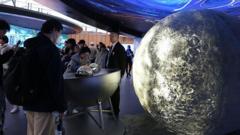Chinese authorities grant access to precious lunar samples from the Chang'e-5 mission for researchers in the US and other countries, aiming to prioritize scientific cooperation despite substantial trade barriers.
Scientific Cooperation Prevails: China Shares Lunar Samples Amidst Trade Tensions

Scientific Cooperation Prevails: China Shares Lunar Samples Amidst Trade Tensions
In a remarkable display of collaboration, China permits US scientists to study its lunar samples, highlighting scientific unity despite ongoing trade conflicts.
In an unexpected twist amid escalating trade disputes, China has opened its doors for scientific collaboration by allowing researchers from six nations, including the United States, to examine rare lunar samples collected during its Chang'e-5 mission in 2020. This initiative, announced by the China National Space Administration (CNSA), illustrates a commitment to advancing space science outside the political fray.
CNSA chief Shan Zhongde emphasized the importance of these lunar samples as "a shared treasure for all humanity," pointing out that the collaboration emerges even as trade tensions between the two powers remain unresolved. Lawmakers in the US, however, have imposed restrictions making it difficult for Chinese researchers to access NASA's lunar samples due to the 2011 legislation prohibiting collaboration without Congressional approval.
Despite these barriers, experts like former Space Policy Institute director John Logsdon argue that the decision to share moon rocks is largely devoid of political implications. He insists that while space technology remains regulated, the study of lunar samples holds no military significance and represents the norm of international scientific cooperation.
The ongoing trade war has seen the US impose tariffs upwards of 245% on Chinese goods, with China retaliating with a 125% tariff on American products. Despite previous suggestions of potential negotiations for easing tensions, Beijing has dismissed claims of ongoing communications with Washington.
In a groundbreaking aspect of the Chang'e-5 samples, scientists have noted that they appear to be significantly younger — around a billion years less aged — than those gathered during the Apollo missions. This discovery could suggest recent volcanic activity on the Moon, reshaping our understanding of lunar geology.
Last year, USA-China space officials expressed interest in negotiating the exchange of samples; however, those discussions did not culminate in an agreement. The CNSA's call for applications has attracted interest not only from US institutions, like Brown University and Stony Brook University, but also from entities in France, Germany, Japan, Pakistan, and the UK.
Shan affirmed that CNSA intends to pursue an "increasingly active and open stance" in global space collaboration, promoting the exchange of information and research under initiatives like the Belt and Road Initiative. He expressed optimism that China's influence in the international space community will continue to expand.



















